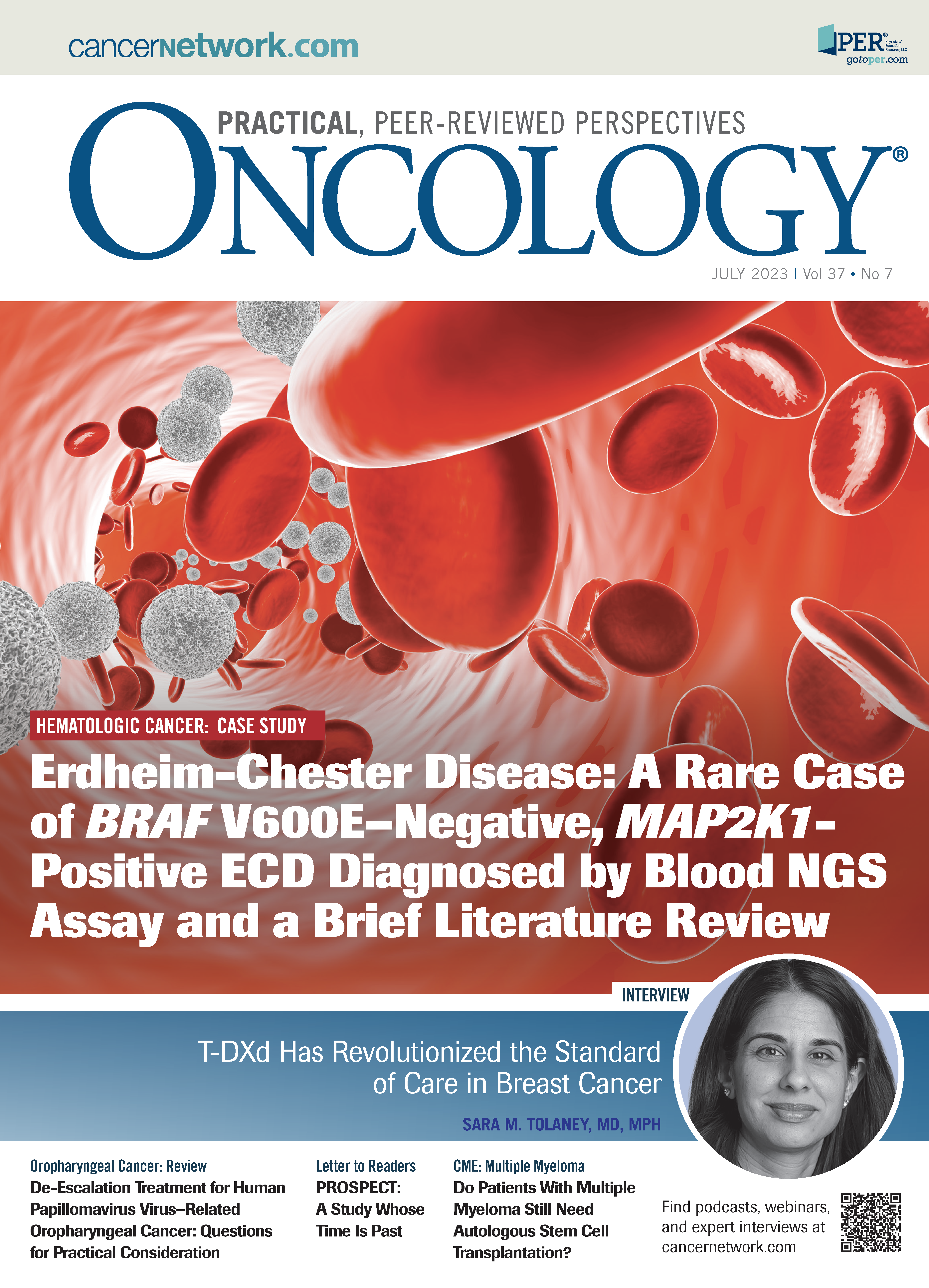PROSPECT: A Study Whose Time Is Past
Co-editor-in-Chief Howard S. Hochster, MD, writes about the past and present of the phase 2/3 PROSPECT trial.

First of all, kudos to Deb Schrag, MD, MPH, and all the investigators of the phase 2/3 PROSPECT trial (NCT01515787) for achieving and completing this landmark study.1 In appreciating its significance, it is helpful to turn back the hands of time to the 1980s. At this time the Gastrointestinal Tumor Study Group performed a 4-arm randomized study in adjuvant therapy of rectal cancer, showing for the first time that both radiation and chemotherapy were better than surgery alone but that the combination of both had the best outcome.2 This study set the stage for an era of surgery, followed by adjuvant chemotherapy and radiation, with radiation sandwiched in the middle 2 months of the 6-month adjuvant program. We also note that, at this time, the standard 5-fluorouracil (5FU)-leucovorin treatment was the “Mayo regimen” with 5 days of bolus of 5FU.
The next major advance in rectal cancer therapy came with the concept of preoperative chemoradiation therapy. Over time, physicians realized that a major long-term toxicity of the postoperative approach described above was many patients having the late adverse effects (AEs) of significant rectal strictures. These patients, after being cured, lived a life with bowel dysfunction. Many of them eventually required colostomy to function relatively normally at work and in daily activities.
This led to the German randomized trial of preoperative chemoradiation (with adjuvant chemotherapy) vs the standard of care, postoperative therapy, whose results demonstrated better local control and equal survival but, importantly, fewer long-term AEs.3 This changed the rectal cancer paradigm to preoperative chemoradiation followed by surgery, followed by 4 to 6 months of adjuvant chemotherapy. Additionally, at the same time, emerging data on rectal surgery suggested that local recurrence in the pelvis could be reduced using a more technically complete surgical approach of total mesorectal excision (TME). This approach, using sharp dissection along the natural tissue planes, and keeping the mesorectal fascia intact, was superior to the prior technique of blunt dissection, using the surgeon’s fingers to mobilize the rectum. With the use of TME, the need for radiation for local control was called into question once more.
It is in this context that the PROSPECT trial was framed about 12 years ago (opening to accrual in 2012), asking the question: Does every patient need chemoradiation after neoadjuvant chemotherapy, in the setting of better surgery and good response to chemotherapy? This was a groundbreaking study, attempting to show that we are overtreating some patients who do not require it. In this study, the “neoadjuvant” therapy functions like a biomarker test for responsive patients with 20% or greater shrinkage as marking a good prognosis with chemotherapy and not needing radiation.
The PROSPECT study unequivocally showed, using a large noninferiority design of 1200 patients, that radiation is not always necessary. For patients with radiographic T2-3 and/or N1 rectal cancers, those who respond to the “chemotherapy test” with more than 20% shrinkage have the same outcome for local recurrence and survival when treated with chemotherapy and surgery as those who received the standard chemoradiation followed by surgery and adjuvant chemotherapy––as proved by noninferior outcomes. We offer a huge “bravo!” to those investigators and patients who participated in the study, and to study leadership in showing we can reduce the amount of toxic therapy.
More recently, progress in the treatment of rectal cancer is focused on the total neoadjuvant therapy (TNT) approach. In this treatment paradigm, chemotherapy and chemoradiation are moved up front and surgery is performed last, and only if necessary. Most importantly, this approach maximizes the number of patients with a clinical complete response (CR) and pathologic complete response (pCR) who may be spared surgical resection. This is particularly important for low-lying cancers, which would otherwise require an abdominoperineal resection. The nonoperative management (NOM) approach was first documented by Angelita Habr-Gama, MD, PhD, in Brazil.
Most recently, findings from the phase 2 OPRA trial (NCT02008656), led by Julio Garcia-Aguilar, MD, PhD, at Memorial Sloan Kettering Cancer Center, showed a high NOM rate and an improved pCR status for patients treated with chemoradiation followed by chemotherapy, compared with the opposite sequence.4 The TNT approach is now favored by the US community in an attempt to spare patients from rectal surgery.
In many respects, the PROSPECT trial has been superseded by advances in therapy for rectal cancer, particularly with the TNT and NOM approaches that eliminate some surgeries rather than radiation. Nonetheless, the PROSPECT trial was a massive undertaking with a 1200-patient sample size. Such a large sample size for a rectal cancer trial has never been achieved in the United States previously. With this noninferiority approach, we can accept the fact that it is safe to treat responding patients without rectal radiation using the chemotherapy-first approach. However, in 2023 the field has moved on from this to the use of TNT and NOM. We do note, though, that there are no large comparative trials to demonstrate the equal efficacy of TNT vs conventional therapy as of this date. We again express our gratitude to the PROSPECT leadership and investigators for showing us an undisputed path to reducing debilitating cancer treatments by adapting treatment to response.
References
- Schrag D, Shi Q, Weiser MR, et al. Preoperative treatment of locally advanced rectal cancer. N Engl J Med. Published online June 4, 2023. doi:10.1056/NEJMoa2303269
- Gastrointestinal Tumor Study Group. Prolongation of the disease-free interval in surgically treated rectal carcinoma. N Engl J Med. 1985;312(23):1465-1472. doi:10.1056/NEJM198506063122301
- Sauer R, Becker H, Hohenberger W, et al; German Rectal Cancer Study Group. Preoperative versus postoperative chemoradiotherapy for rectal cancer. N Engl J Med. 2004;351(17):1731-1740. doi:10.1056/NEJMoa040694
- Habr-Gama A, Perez RO, Nadalin W, et al. Operative versus nonoperative treatment for stage 0 distal rectal cancer following chemoradiation therapy: long-term results. Ann Surg. 2004;240(4):711-718. doi:10.1097/01.sla.0000141194.27992.32
- Garcia-Aguilar J, Patil S, Gollub MJ, et al. Organ preservation in patients with rectal adenocarcinoma treated with total neoadjuvant therapy. J Clin Oncol. 2022;40(23):2546-2556. doi:10.1200/JCO.22.00032
